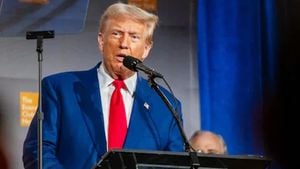Saudi Arabia is rolling out the red carpet for some of the biggest names in finance and technology as it prepares to host the Future Investment Initiative (FII), often dubbed "Davos in the desert." Scheduled for this coming week, the event serves as both a showcase of the kingdom’s ambitions and a test of investor appetite amid increasing geopolitical tensions, particularly heightened by conflicts like those between Israel and Iran.
Specifically, attendees will navigate through significant regional instability, knowing full well the boundaries of even Saudi Arabia’s vast oil wealth. With almost $1 trillion parked away in sovereign wealth, the stakes are high, and the international executive roster includes familiar faces such as David Solomon from Goldman Sachs, Jane Fraser from Citigroup, and BlackRock's Larry Fink. They’re set to return this year, embodying the optimism around Crown Prince Mohammed bin Salman’s Vision 2030—a thousand-billion-dollar economic overhaul aimed at transforming the kingdom's economy.
The spotlight will not only shine on traditional finance; the summit boasts the attendance of tech giants as well. Alphabet Inc.'s Ruth Porat and TikTok’s Shou Chew will address the gathering for the first time, joined by prominent tech entrepreneurs like Benjamin Horowitz from Andreessen Horowitz. This reflects Saudi Arabia’s pivot toward technology and artificial intelligence, signaling its endeavor to establish itself as a global tech powerhouse.
While international players are eager to tap the kingdom’s financial resources, the backdrop of increasing uncertainty is unavoidable. Recently, the Saudi government has actively sought to ease regional tensions, hoping to attract foreign capital and technological expertise to bolster its long-term vision. Nevertheless, experts like Gregory Gause, Professor of International Affairs at Texas A&M University, note, "Capital is not attracted to conflict regions, even if the country is not an immediate participant." This paints a rather grim picture for foreign investment amid the tumultuous regional climate.
Despite these concerns, Saudi Arabia is barreling forward with development plans. According to Richard Attias, CEO of the FII Institute, over $28 billion worth of deals are expected to be unveiled at the summit. A notable focus will be on artificial intelligence, with indications of potentially launching up to $40 billion worth of investments through partnerships, including with Andreessen Horowitz to propel AI innovations.
Investments are also slated for alternative energies, including hydrogen. The kingdom anticipates announcing the creation of a new firm purely dedicated to producing hydrogen—an important element as the world strives to shift away from fossil fuels. With projections showing at least $10 billion dedicated to these green initiatives, Saudi Arabia is angling to be at the forefront of the energy transition.
On the financial front, two exchange-traded funds will soon hit the market, allowing Saudi investors access to Hong Kong stocks, thereby deepening ties with China, its largest trading partner. Notably, Hong Kong Financial Secretary Paul Chan will be one of the high-profile speakers from Asia at the FII.
Unfortunately, the pervasive regional conflict weighs heavily on investor sentiment toward Saudi Arabia, directly affecting how global markets perceive the opportunity within its borders. A recent assessment from Copley Fund Research indicates the momentum of actively managed funds with Saudi exposure surged until earlier this year but has since stagnated at around 56%. Investments correlated with the Saudi stock market faltered as tensions between Israel and Iran escalated and investors remain cautious.
Facing the reality of its financial capabilities, Crown Prince Mohammed bin Salman has acknowledged the limitations of Saudi Arabia’s resources. The government forecasted deficits extending at least until 2027, leading to the inevitable postponement of some ambitious projects. The public investment fund (PIF), the lynchpin behind many initiatives like the $1.5 trillion Neom project, is shifting focus toward domestic investments, raising concerns among international fund managers about potential limited cash flow for foreign endeavors.
Prior to the FII, Zaid Belbagi, managing partner at Hardcastle Advisory, observed, “The FII has always been meant to attract investments to Saudi Arabia, yet it has turned out to be more of a chance for foreign executives to access financing from the kingdom.” Nonetheless, the expectations of significant international interest this year are reflected by over 7,000 registrations already confirmed for the summit—an increase from the previous year—even amid heightened regional hostilities.
Meanwhile, additional news emerges from Saudi Arabia about the country's latest architectural endeavor: the grand project named "The Mukaab." Announced recently, this ambitious cube-shaped structure is set to soar 400 meters high and become one of the world's largest buildings, capturing worldwide attention.
Constructed on over 19 square kilometers at the crossroads of King Salman and King Khalid Roads, The Mukaab will encompass 104,000 residential units, 9,000 hotel rooms, and massive retail and office spaces, totaling around 25 million square meters of floor area—about twenty times larger than New York's Empire State Building. The project aligns with the Kingdom’s Vision 2030, emphasizing economic diversification and bolstering tourism within the region.
Attracting even more intrigue, the design of The Mukaab includes state-of-the-art technology, featuring augmented reality on its exterior and AI-driven holographs within, presenting visitors with sensory experiences depicting various epochs and realities. This ambitious project has sparked some controversy online, drawing comparisons to the Kaaba—the holiest site within Islam—raising concerns over perceived distractions from its sanctity.
The Canadian firm AtkinsRéalis has secured the contract to oversee The Mukaab's construction, symbolizing yet another leap toward Saudi Arabia’s goal to diversify its economy and establish itself as a global player beyond oil sales. These moves coincide with Saudi Arabia's significant advancements on several other monumental initiatives like "The Line," promising efficient and sustainable living across its expansive landscapes.
Despite the challenges posed by geopolitical tensions, fiscal limitations, and skepticism among foreign investors, Saudi Arabia seems intent on pushing forward with its ambitious plans. The next few weeks could be telling as the world watches the developments from the FII and the construction of The Mukaab closely, perhaps marking the kingdom's step toward reimagining its role on the global stage.



